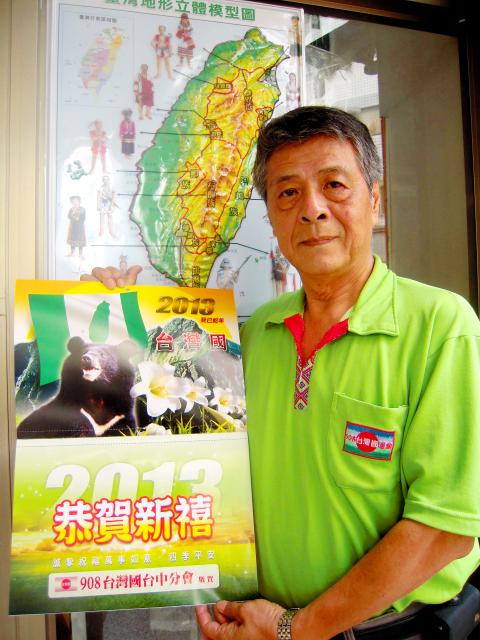With 2013 around the corner, the 908 Taiwan Republic Campaign has produced a calendar in an effort to strengthen pro-localization consciousness and make Taiwanese history more widely known.
The numbers 908 — signifying the date on which the San Francisco Peace Treaty was signed — are included in the pro-Taiwan independence organization’s name because founder and convener Peter Wang (王獻極) believes that Japan gave up its rights of governance over Taiwan but made no mention of who it ceded control to, making Taiwan a sovereign country that is, in Wang’s words, temporarily and unlawfully occupied by the “Republic of China government-in-exile.”
The campaign’s Greater Taichung branch — in what it says was an attempt to highlight the pro-China attitude of President Ma Ying-jeou’s (馬英九) administration — said it wanted to reinforce Taiwan’s pro-local consciousness, leading to the making and printing of the calendars.

Photo: Su Chin-fong, Taipei Times
The first batch of 2,000 produced by the branch have been quickly snapped up, the group said, adding that a second batch of 2,000 is on the verge of being sold out too.
The pictures used to illustrate each month in the calendar are all symbols of Taiwan, such as Yushan (玉山), the Formosan black bear and the Taiwan lily.
The Taiwan lily and Formosan black bear are both endemic to Taiwan, while Yushan is the nation’s highest mountain.
The calendar also includes major events from Taiwanese history in the corresponding month in which they took place, such as the occupations of Taiwan by the Netherlands, the Qing Dynasty, the Japanese Empire and the Republic of China government.
The calendar also features other significant national dates, such as the 228 Massacre and the Lin Family Massacre in February, while March 18 is also highlighted as the date of the first transfer of power from the Chinese Nationalist Party (KMT) to the Democratic Progressive Party in 2000.
The 228 Massacre refers to a brutal crackdown following an uprising in February 1947 against Chiang Kai-shek’s (蔣介石) KMT, which left tens of thousands dead and led to a nearly four-decade-long period of martial law.
The Lin Family Massacre refers to the death of the mother and young twin daughters of democracy activist Lin Yi-hsiung (林義雄), then on trial for his involvement in the 1979 Kaohsiung Incident.
The murders are suspected to have been the work of government intelligence operatives, but the case remains unsolved.
Chang Chih-mei (張志梅), a social activist, said the calendar was in essence a truncated version of Taiwan’s modern history.
Chang said that the calendar has received great feedback since going on sale, adding that he had given many as gifts to pro-local organizations.
“They all said it was a great idea and wanted to reprint it to give to others,” Chang said.
As the purpose of the calendar is to promote pro-localization ideas, they belong to every Taiwanese, the group said, adding that it welcomes any organization that wants to reprint the calendar for distribution.

Taiwan has received more than US$70 million in royalties as of the end of last year from developing the F-16V jet as countries worldwide purchase or upgrade to this popular model, government and military officials said on Saturday. Taiwan funded the development of the F-16V jet and ended up the sole investor as other countries withdrew from the program. Now the F-16V is increasingly popular and countries must pay Taiwan a percentage in royalties when they purchase new F-16V aircraft or upgrade older F-16 models. The next five years are expected to be the peak for these royalties, with Taiwan potentially earning

STAY IN YOUR LANE: As the US and Israel attack Iran, the ministry has warned China not to overstep by including Taiwanese citizens in its evacuation orders The Ministry of Foreign Affairs (MOFA) yesterday rebuked a statement by China’s embassy in Israel that it would evacuate Taiwanese holders of Chinese travel documents from Israel amid the latter’s escalating conflict with Iran. Tensions have risen across the Middle East in the wake of US and Israeli airstrikes on Iran beginning Saturday. China subsequently issued an evacuation notice for its citizens. In a news release, the Chinese embassy in Israel said holders of “Taiwan compatriot permits (台胞證)” issued to Taiwanese nationals by Chinese authorities for travel to China — could register for evacuation to Egypt. In Taipei, the ministry yesterday said Taiwan

Taiwan is awaiting official notification from the US regarding the status of the Agreement on Reciprocal Trade (ART) after the US Supreme Court ruled US President Donald Trump's global tariffs unconstitutional. Speaking to reporters before a legislative hearing today, Premier Cho Jung-tai (卓榮泰) said that Taiwan's negotiation team remains focused on ensuring that the bilateral trade deal remains intact despite the legal challenge to Trump's tariff policy. "The US has pledged to notify its trade partners once the subsequent administrative and legal processes are finalized, and that certainly includes Taiwan," Cho said when asked about opposition parties’ doubts that the ART was

If China chose to invade Taiwan tomorrow, it would only have to sever three undersea fiber-optic cable clusters to cause a data blackout, Jason Hsu (許毓仁), a senior fellow at the Hudson Institute and former Chinese Nationalist Party (KMT) legislator, told a US security panel yesterday. In a Taiwan contingency, cable disruption would be one of the earliest preinvasion actions and the signal that escalation had begun, he said, adding that Taiwan’s current cable repair capabilities are insufficient. The US-China Economic and Security Review Commission (USCC) yesterday held a hearing on US-China Competition Under the Sea, with Hsu speaking on